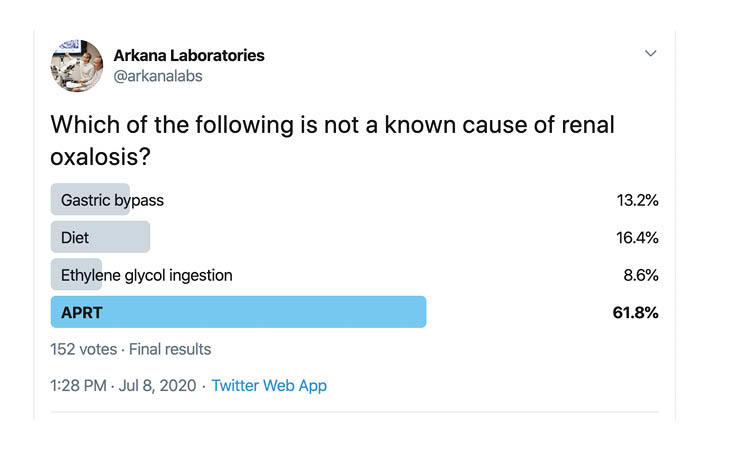ANSWER: D
Renal oxalosis is a progressive tubulointerstitial disease which can be primary or secondary in nature. Specifically, secondary causes can be due to increased ingestion or absorption of sources of oxalate, decreased excretion, and certain vitamin imbalances. Oxalosis secondary to ingestion can occur with ingestion of oxalate containing foods such as rhubarb, spinach, peanuts, tea, starfruit, and ethylene glycol poisoning, among others. Increased absorption of oxalate containing substances occurs in maladaptive states such as after gastric/intestinal bypass surgery, prolonged antibiotic use, Crohn’s disease, pancreatic insufficiency, and in short bowel syndrome. Other causes of oxalosis would include hypervitaminosis C, vitamin B6 deficiency, and drugs (i.e. methoxyflurane, Orlistat, Praxilene, and COX-2 inhibitors). Treatment is aimed at removing the source of excess oxalate, possible reversal of gastric bypass, and hemodialysis. Below are just a few references available on causes of secondary oxalosis. Adenine phosphoribosyltransferase deficiency leads to increased 2, 8 DHA crystals in tubular lumens as opposed to oxalate.
References:
- Nasr SH, D’Agati VD, Said SM, et al. Oxalate nephropathy complicating Roux-en-Y Gastric Bypass: an underrecognized cause of irreversible renal failure. Clin J Am Soc Nephrol. 2008 Nov;3(6):1676-83.
- Cossey LN, et al. Oxalate nephropathy and intravenous vitamin C. Am J Kid Dis 2013; 61:1032-1035.
Quick note: This post is to be used for informational purposes only and does not constitute medical or health advice. Each person should consult their own doctor with respect to matters referenced. Arkana Laboratories assumes no liability for actions taken in reliance upon the information contained herein.

